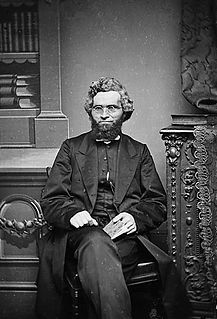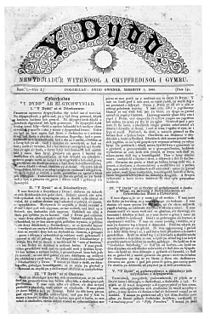 | |
| Type | Weekly newspaper |
|---|---|
| Headquarters | Caernarfon |
Y Genedl Cymreig (established in 1877) was a weekly Welsh language newspaper containing general news and information. It was published by Thomas Jones. [1]
 | |
| Type | Weekly newspaper |
|---|---|
| Headquarters | Caernarfon |
Y Genedl Cymreig (established in 1877) was a weekly Welsh language newspaper containing general news and information. It was published by Thomas Jones. [1]

James (Jeremiah) Griffiths was a Welsh Labour Party politician, trade union leader and the first Secretary of State for Wales.

Cawl is a Welsh dish. In modern Welsh the word is used for any soup or broth; in English it refers to a traditional Welsh soup, usually called cawl Cymreig in Welsh. Historically, ingredients tended to vary, but the most common recipes are with lamb or beef with leeks, potatoes, swedes, carrots and other seasonal vegetables. Cawl is recognised as a national dish of Wales.

Thomas Gee, was a Welsh Nonconformist preacher, journalist and publisher.

The media in Wales provide services in both English and Welsh, and play a role in modern Welsh culture. BBC Wales began broadcasting in 1923 have helped to promote a form of standardised spoken Welsh, and one historian has argued that the concept of Wales as a single national entity owes much to modern broadcasting. The national broadcasters are based in the capital, Cardiff.

Ieuan Gwyllt was the bardic name of Welsh musician and minister John Roberts. His bardic name is derived from the nom de plume he used whilst writing poetry as a boy, Ieuan Gwyllt Gelltydd Melindwr. He was born at Tanrhiwfelen, a house just outside Aberystwyth, and died in Caernarfon on 14 May 1877. He was buried at Caeathro cemetery near Caernarfon.
Robert Thomas Jenkins CBE was a Welsh historian and academic.
Underwater Hockey Wales (UHW) is responsible for underwater hockey in Wales. It is the association representing British Octopush Association (BOA) clubs based in Wales. It has seven member clubs. Underwater Hockey Wales is affiliated to the Welsh Association of Sub Aqua Clubs – the national governing body for underwater sports in Wales, comprising scuba diving, underwater hockey, and snorkelling.
John Rowlands was a Welsh language author of several novels including Lle bo'r gwenyn. He was also a professor of Welsh literature.
The Dictionary of Welsh Biography (DWB) is a biographical dictionary of Welsh people who have made a significant contribution to Welsh life over seventeen centuries. It was first published in 1959, and is now maintained as a free online resource.

William David Owen, born William Owen, was a Welsh author best known for his novel Madam Wen.

Hugh Hughes (1790–1863) was a Welsh painter, engraver and writer.

Y Tyst Cymreig was a weekly Welsh language newspaper. It contained local, national, and foreign news. Although in 1871 it merged with Y Dydd to form Tyst a'r Dydd the arrangement did not last, and the Tyst a'r Dydd was moved to another publisher in Merthyr Tydfil. Associated titles: Y Dydd ; Y Tyst a'r Dydd (1871–1891)

Y Dydd was a weekly liberal Welsh language newspaper established by Samuel Roberts in 1868 that was distributed in North Wales. Y Dydd contained general political and religious news and opinions.

Y Tyst a'r Dydd was a weekly Welsh language newspaper established in 1871 as a result of the merger of Y Dydd' and Tyst Cymreig.

William Williams was a Welsh Congregational minister, poet and literary critic born at Bryn y Ffynnon, Denbigh. He was one of the leading figures in the Welsh Eisteddfod movement and did much to raise the standards of Welsh literature of his time.

Sarah Winifred Parry was a Welsh writer most known for developing the modern Welsh short story. She used her nickname Winnie Parry as her pen name. She became a household name with her serialized fiction in periodicals at the turn of the twentieth century. Her most acclaimed work, Sioned, first published as a serial between 1894 and 1896 was introduced as a novel in 1906 and was reissued in 1988 and 2003.

Thomas Johns was a Welsh Independent (Congregationalist) minister, best known for his pastorate at Capel Als, Llanelli, one of the largest chapels in Wales, from 1869 until his death in 1914.

Isaac Foulkes (Llyfrbryf) (1836–1904) was a Welsh author and editor.
The Welsh Camerata is a chamber choir of 25-30 singers based in Cardiff, Wales, United Kingdom, specialising in the performance of early music. The choir is constituted as a company limited by guarantee.